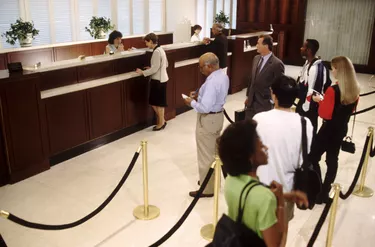
Cashier's checks are generally considered to be a safe and secure way of making a payment. Cashing one of these checks can, however, present a problem if you don't have a bank account of your own. If this is the case, your cashier's check cashing options include either visiting the issuing bank and asking a teller to cash the check or using a check-cashing service.
What Is a Cashier's Check?
Video of the Day
According to Bankrate.com, a cashier's check is issued by a bank and drawn on a bank's funds. People usually purchase cashier's checks when they need to make a substantial payment, usually $1,000 or more, and want to do so securely. Bank customers authorize a teller to withdraw funds from the customer's account which is paid to the bank. The bank then prints out a check payable to the intended recipient.
Video of the Day
Because the funds have been paid to the bank, neither the payor nor payee have to worry about the check bouncing. In addition, the purchase and cashing of a cashier's check creates a paper trail establishing that the transaction took place.
Visit the Issuing Bank
All legitimate cashier's checks have the name of the issuing bank printed on the check. If that bank has a branch in your area, you might be able to get the check cashed there.
Call the bank and explain that you don't have an account, but have a cashier's check drawn on the bank. Ask if the bank will cash it for you. If the bank offers this service, ask what forms of identification are required by the bank. You should also be prepared to pay a fee for this service.
Use a Check-Cashing Service
If the bank does not have a branch close to you, or the bank refuses cashier's check cashing services for non-customers, you might have some luck with a check-cashing service. You can find these services as independent, standalone businesses or at the customer service desks of many big-box stores and supermarkets. Again, it's a good idea to call ahead to find out whether the service will cash your cashier's check. Since check-cashing services aren't banks and don't offer identical services, you should ask about the following:
- Does the service set a cap on the check amount?
- What kind of identification do you need?
- Is there a verification process? How long will it take?
- What is the fee for cashing the check?
- Can you have the money loaded onto a pre-paid debit card at the store or service, or will you have to take it in cash?
Cashier's Check Precautions
While cashier's checks are generally considered to be a very secure form of payment, forged cashier's checks are sometimes used in scams. Technology has made it easier than ever for criminals to create fake cashier's checks: As the Better Business Bureau notes, it is possible to purchase heavy paper stock that can be used to print fraudulent checks, which means that even bank tellers can be fooled by these checks. Never rely on a check's appearance when determining if it is valid.
There are several things you can do to protect yourself against a cashier's check scam:
- Only accept a cashier's check from someone that you know. There are several electronic payment options available, including PayPal, Venmo and Zelle. Ask the person to use one of these services.
- Before completing a transaction, contact the bank on which the check has been drawn. Do not use the phone number printed on the check. Instead, look up the bank online, find the bank's official website, call the bank and ask for verification.
- Tell the person paying you with the check that you will need to ensure that the check clears before providing goods or services.
- If someone sends you a cashier's check for more than what you are owed and asks you to cash the check and send back the balance, refuse the check. According to the Washington State Department of Financial Institutions, this is a classic scam.